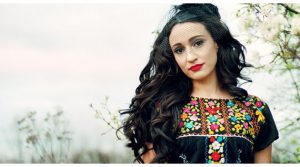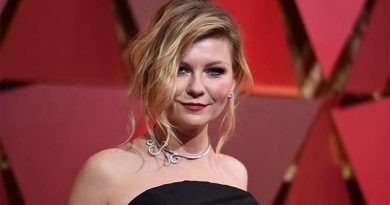Lindi Ortega: ‘Music Helps Me Cope with Body Dysmorphic Disorder’

Lindi Ortega’s new album is a musical movie noir, inspired by Ennio Morricone’s spaghetti western soundtracks and the movies of Quentin Tarantino.
Over 15 tracks and three acts, it follows a character on the journey from a bleak place where “daylight never comes”, to one of hope and liberation.
While the story is fictional, it mirrors Ortega’s own personal struggle, which she revealed in a frank and compelling essay earlier this month.
Titled In the Mirror, a Fractured Reflection, it described the singer’s affliction with body dysmorphic disorder (BDD), and how it had affected both her career and her personal life.
“My self-image grew so distorted that I actually convinced myself I was deformed,” said the 37-year-old, a two-time winner at the Canadian Country Music Association Awards.
“People often ask me where my dark, lonely songs come from. This is that place.”
Ortega went on to describe her horror at having her photograph taken and how she started wearing veils and wide-brimmed hats on stage to hide her face.
But, she said, music ultimately helped her confront the condition.
“Even on the days when I’ve felt particularly ugly, I still have to go on stage and sing my heart out for the fans,” she wrote.
According to mental health charity MIND, BDD can touch every aspect of your life, including work, social life and relationships. It can also lead to depression, self-harm and even thoughts of suicide.
Statistics suggest that up to one in 50 people suffer from the condition, Ortega tells the BBC, adding: “I’m assuming that there’s even more that don’t talk about it.”
That’s why, five albums into her career, she finally felt confident to tell her fans her story.
“I was nervous to talk about it before for a number of reasons,” she tells the BBC.
“Earlier on [in my career] I was still suffering very heavily from it, so I didn’t think I was in a position to offer any kind of advice.
“But I also didn’t want to be known as ‘the singer with body dysmorphic disorder’ – so it took until this time in my life to be able to speak about it.”
Ortega hopes that, by talking publicly about the condition, she can help fellow sufferers “identify what they have” and “offer some insight into it”.
“I just wanted to show people you don’t have to stifle your life because you have a disorder,” she says.
“I want to tell people they’re not alone. If I can do this, you can do this.”
‘Devastating’
One of the biggest challenges she’s had to face, she says, is people who dismiss her condition as vanity.
“It’s a lack of understanding of the sort of mental turmoil somebody with body dysmorphic disorder is going through,” she says.
“It’s not just, ‘oh, I feel ugly today’. It’s so much more devastating to your quality of life.
“It affects your socialising with people, you hinder yourself from going out and experiencing life like most people do. You suffer with depression and your relationships are affected.
“So to just say, ‘everyone feels ugly once in a while,’ it’s not just that. It’s so much more than that.”
Though not cured, Ortega says she has learned to cope – thanks, at least in part, to a psychologist she saw at university who helped her understand the disease.
And while her new album isn’t autobiographical, the character’s story undeniably parallels her own.
“In the first part is a character that’s in darkness, who feels like maybe they embody darkness,” she says.
“The middle part is travelling through the storm and beating down the demons, and then the end of it is coming out victorious on the other end and feeling liberated from the things that weighed them down, and appreciating being alive.”
The album’s first single was the fiery, vengeful Comeback Kid – about a Kill Bill-style heroine who was shot and left for dead, but comes back to haunt their tormentor.
“You took my life and wrecked it, but I’ve been resurrected,” she growls over a ragged hillbilly beat, “And baby what you get is exactly what you deserve.”
It’s notable that, in the chronology of Ortega’s career, The Comeback Kid was her first release after a sombre ballad Final Bow.
Released last year, it was written at her lowest ebb, after she was dropped by her record label and found herself scraping pennies to make a living. At the time, she intended it to be her last record.
“No more singing. No more dancing. No more late-night pony prancing in these boots,” she sings on the track, referencing the bright-red cowboy boots that had become her trademark.
“I started off chasing the carrot and wanting what most musicians want – the record deal, and to get a song on the radio,” she says.
“You know, the dream… And then my dream was crushed. I almost gave up music and I was very disenchanted with the industry. I thought everything was over.”
“The reason I came back to making music was because of the fans,” she adds.
“When I was about to give up, I would read messages they’d sent me about how certain songs of mine helped them through really dark times.
“And then I felt like it was my duty, in a way, to continue to write these songs so maybe I could help someone else.”
That’s why Liberty deliberately ends on a positive note.
The turning point comes on Lovers in Love, a timeless love song inspired by her husband, fellow country singer Daniel Huscroft.
“I’ve written so many heartbreak songs,” she reflects, “and I wanted to put a little bit of love in the character’s story because I never thought I could be loved. Then I did. I got married last year, in September, and I never even thought that was possible for me.”
The album continues in an optimistic vein through to the closing track, a cover of Violeta Parra’s Gracias a la Vida (Spanish for “thank you to life”).
Ortega sings it entirely in Spanish, “which was a bit of a challenge because I’m not fluent,” she laughs.
“My dad’s Mexican – so there was a lot of calling him up and singing the lines to him and asking if I was pronouncing things right!
“But it was very important for me to end this record on a positive note – because the idea is to show there is light in the dark.
“Life is a gift and we all have dark and horrible moments – but we’ve got to fight to enjoy the beautiful moments, because they’re all we’ve got.”
Lindi Ortega releases Liberty in the US this week, and on 25 May in the UK.
Courtesy : BBC
Photo : eventfinda.co.nz
[social_warfare buttons=”Facebook,Pinterest,LinkedIn,Twitter,Total”]



